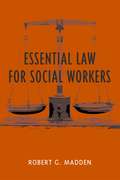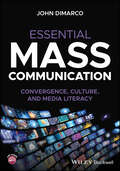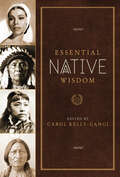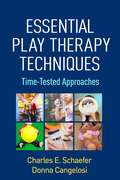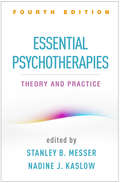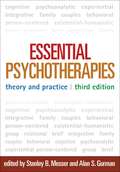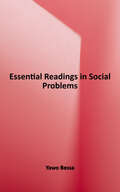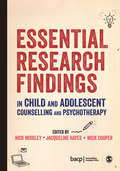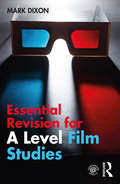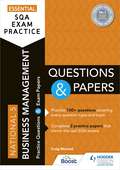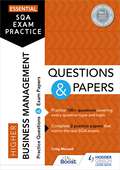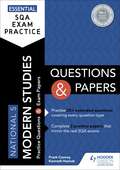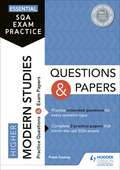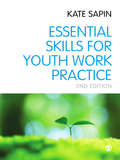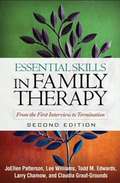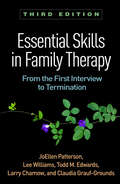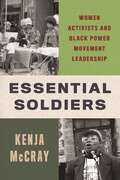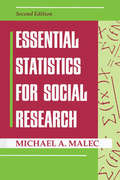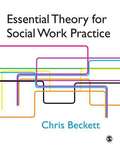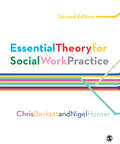- Table View
- List View
Essential Law for Social Workers (Foundations of Social Work Knowledge Series)
by Robert MaddenWhether protecting their own rights or those of their clients, or navigating the juvenile justice, immigration, or welfare systems, social workers confront legal issues every day. This book explores legal concepts, legal reasoning, and legal processes—illustrated with case vignettes from social work practice—in order to provide social work practitioners and students with practical and accessible legal knowledge. It introduces readers to scholarship about the law and to conceptual knowledge that can be applied to any interaction with the legal system. Social workers are thereby enabled to "think like a lawyer" and increase their effectiveness. The volume features a discussion of recent reform movements, including Alternative Dispute Resolution, and an appendix of sources for legal information and research on the law.
Essential Mass Communication: Convergence, Culture, and Media Literacy
by John DiMarcoHelps students develop the ability to analyze culture and utilize media literacy techniques, provides the core skills necessary to succeed in a communications career Essential Mass Communication helps students build a strong understanding of communication theory, mass communication technology, information studies, and mass communication practices. Offering an expanded view of the field, this comprehensive textbook combines easily accessible coverage of core skills and concepts with historically critical content on mass communication revolutions, cultural impacts, and converging media as they changed society. Throughout the text, author John DiMarco integrates professional practice components into each chapter, including professional pathways to applying mass communication to students' careers. Essential Mass Communication addresses a variety of creative fields, such as storytelling, rhetoric, journalism, marketing and advertising, design, fine art, photography, and filmmaking. Student-friendly chapters explore a uniquely wide range of topics, from introductory content on communication process and product to more in-depth discussion of game history and theory, critical theory, strategic communication, and more. Designed to help aspiring creative professionals learn and use the technology tools and channels available to deliver cultural and personal experiences in the form of media products, Essential Mass Communication: Introduces the concepts of mass communication and establishes foundations for understanding convergence and culture Provides the skills and knowledge required to apply critical media literacy analysis techniques in different fields Discusses the driving technologies, key people, convergence, and cultural instances of each mass communication media Covers the business and information disciplines of mass communication, including ethics and communication law Highlights the connection between communication technologies, culture, and careers in mass media Includes a wealth of real-world case studies, applied examples and assignments, key term definitions, end-of-chapter questions, in-text QR codes linking to internet sources, and valuable appendices for career development With a strong focus on creative, active learning, Essential Mass Communication: Convergence, Culture, and Media Literacy is the perfect textbook for undergraduate and graduate courses in Mass Communication, Information Studies, and Communication technologies, as well as relevant courses in Media Studies, International Communications, and Marketing, Advertising, and Public Relations programs.
Essential Mathematics for Political and Social Research
by Jeff GillEssential Mathematics for Political and Social Research addresses an educational deficiency in the social and behavioral sciences. This 2006 book was the first of its kind to specifically address the comprehensive introduction to the mathematical principles needed by modern social scientists. The material introduces basic mathematical principles necessary to do analytical work in the social sciences, starting from first principles, but without unnecessary complexity. The core purpose is to present fundamental notions in standard notation and standard language with a clear, unified framework throughout. Through examples and exercises, this book is intended to not only motivate specific mathematical principles and practices, but also introduce the way that social science researchers use these tools. The intended emphasis is on conceptual understanding of key principles and their subsequent application.
Essential Native Wisdom (Essential Wisdom)
by Carol Kelly-GangiQuotations from Sitting Bull, Wilma Mankiller, N. Scott Momaday, and many more.Essential Native Wisdom gathers hundreds of powerful quotations from an extraordinary group of people from the mid-1700s to the present day. There are excerpts from political and spiritual leaders; writers and poets; activists and artists; warriors and statesmen; scholars and historians; actors and athletes; and musicians and orators. It’s a wide-ranging collection that is enlightening and engaging—and provides a testament to the spirit of strength, endurance, and hope. Sitting Bull eloquently reveals the devastating hardship his people endured at the hands of the white leaders who sought to destroy their way of lifeWinona LaDuke vividly recalls traditions from her people, passed down from generation to generationElizabeth Peratrovich speaks passionately about the freedoms that are guaranteed to Native people under the Bill of Rights, and more
Essential Play Therapy Techniques
by Charles E. Schaefer Donna CangelosiHighly practical and user friendly, this book presents 58 play therapy techniques that belong in every child clinician's toolbox. The expert authors draw from multiple theoretical orientations to showcase powerful, well-established approaches applicable to a broad range of childhood problems. Activities, needed materials, and variations of each technique are succinctly described. Of critical importance for today's evidence-based practitioner, each chapter also includes a historical perspective on the technique at hand, a rationale explaining its therapeutic power, and a review of relevant empirical findings. The book enables readers to determine which strategies are appropriate for a particular child or group and rapidly incorporate them into practice.
Essential Psychotherapies, Fourth Edition: Theory and Practice
by Stanley B. Messer Nadine J. KaslowAcclaimed for its clear writing and stellar contributors, this authoritative text is now in a revised and updated fourth edition. The book explains the history, assessment approach, techniques, and research base of each of the 12 most important psychotherapies practiced today, along with its foundational ideas about personality and psychological health and dysfunction. The consistent chapter format facilitates comparison among the various approaches. Every chapter includes engaging clinical vignettes and an extended case example that bring key concepts to life, as well as suggested resources for further learning. New to This Edition *Incorporates important developments in clinical practice and research. *Entirely new chapters on CBT, third-wave CBT, couple therapies, and interpersonal and brief psychodynamic therapies; all other chapters fully updated. *Increased attention to multiple dimensions of diversity, the evidence-based practice movement, psychotherapy integration, and applications to physical health care.
Essential Psychotherapies, Third Edition
by Alan Gurman Stanley MesserThe leading survey text for basic psychotherapy courses, this book offers authoritative, engaging presentations of the 12 most important forms of psychotherapy practiced today. Prominent experts cover traditional treatments as well as influential models that have been developed relatively recently, giving students and practitioners a solid grasp of foundational theories, techniques, and research. Each chapter follows a common set of organizational guidelines; features illustrative vignettes and a full case example; and concludes with readings and resources to guide further study. New to This Edition *Incorporates the latest clinical developments and research. Chapter on "third-wave" behavior therapies. Each chapter has expanded discussions of the role of the therapeutic relationship and the use of evidence-based practices. Concise chapters make the book even more instructor and student friendly.
Essential Readings in Social Problems
by Yawo BessaThis book provides students with a collection of engaging and thought-provoking articles that deepen their understanding of the topics and themes discussed within courses that address social issues. The anthology is organized into six distinct units. The opening unit introduces readers to the concept of the sociological imagination, which allows individuals to make connections between social structures and individual conditions to formulate social theories. In Unit 2, the readings examine the destructive nature of inequality, causes of poverty, issues related to gender inequality, and more. Unit 3 focuses on the concept of deviance and how it applies to sexuality and crime. Units 4 and 5 explore the relationship between race, ethnicity, white privilege, and social problems, and the intersection of human health and environmental problems. Dedicated readings address the social construction of race, biodiversity, and more. Unit 6, the final unit, offers readers a variety of proposed solutions for social problems with an emphasis on social movements to combat economic inequality, increasing authoritarianism, and ecological crises. Designed to stimulate critical thought, Essential Readings in Social Problems is an ideal supplementary text for courses in sociology and any other course that explores social challenges.
Essential Research Findings in Child and Adolescent Counselling and Psychotherapy
by Professor Mick Cooper Nick Midgley Jacqueline Hayes HayesWhat can child and adolescent counsellors and therapists learn from research? What evidence is there for the effectiveness of different therapies and techniques? How can developmental or neuroscience research inform or inspire therapeutic work with young people? This book provides the answers to these questions, and more. Leading experts in the field take you through the latest research findings in child and adolescent therapy, discussing how each is relevant to the work of practitioners. Today, both therapists and trainees need to be aware of, and engage with, research findings. The book presents, accessibly, the current best knowledge and its implications for practice.
Essential Revision for A Level Film Studies
by Mark DixonThis comprehensive revision guide contains everything students need to know to succeed on their A Level Film Studies course. Essential Revision for A Level Film Studies features engaging and accessible chapters to help learners develop a deeper understanding of the key elements of film form, including cinematography, mise en scène, performance, lighting, editing and sound. The book offers detailed explanations of the specialist study areas required for the A Level course, including auteur theory, spectatorship, genre, key critical debates, narrative and ideology, as well as overviews of key film movements like French New Wave cinema, German Expressionism and Soviet Montage. Also included are practical exercises designed to help students apply essential concepts to film set texts, sample exam responses for both Eduqas and OCR exam boards, and challenge activities designed to help students secure premium grades. With its practical approach and comprehensive scope, Essential Revision for A Level Film Studies is the ideal resource for students and teachers. The book also features a companion website at EssentialFilmRevision.com, which includes a wide range of supporting resources including revision flashcards and worksheets, a bank of film set text applications for exam questions for all film specifications, and classroom-ready worksheets that teachers can use alongside the book to help students master A Level Film exam content.
Essential SQA Exam Practice: From the publisher of How to Pass
by Craig McLeodExam board: SQALevel: National 5Subject: Business ManagementFirst teaching: August 2017First exam: Summer 2018Practice makes permanent. Feel confident and prepared for the SQA National 5 Business Management exam with this two-in-one book, containing practice questions for every question type and topic, plus two full practice papers - all written by an experienced examiner.> Choose to revise by question type or topic: A simple grid enables you to pick particular question styles or course areas that you want to focus on, with answers provided at the back of the book> Remember more in your exam: Repeated and extended practice will give you a secure knowledge of the key areas of the course (understanding business; management of marketing; management of operations; management of people; management of finance)> Familiarise yourself with the exam paper: Both practice papers mirror the language and layout of the real SQA papers; complete them in timed, exam-style conditions to increase your confidence before the exams> Find out how to achieve a better grade: Answers to the practice papers have commentaries for each question, with tips on writing successful answers and avoiding common mistakesFully up to date with SQA's requirementsThe questions, mark schemes and guidance in this practice book match the requirements of the revised SQA National 5 Business Management specification for examination from 2018 onwards.
Essential SQA Exam Practice: From the publisher of How to Pass
by Craig McLeodExam board: SQALevel: National 5Subject: Business ManagementFirst teaching: August 2017First exam: Summer 2018Practice makes permanent. Feel confident and prepared for the SQA National 5 Business Management exam with this two-in-one book, containing practice questions for every question type and topic, plus two full practice papers - all written by an experienced examiner.> Choose to revise by question type or topic: A simple grid enables you to pick particular question styles or course areas that you want to focus on, with answers provided at the back of the book> Remember more in your exam: Repeated and extended practice will give you a secure knowledge of the key areas of the course (understanding business; management of marketing; management of operations; management of people; management of finance)> Familiarise yourself with the exam paper: Both practice papers mirror the language and layout of the real SQA papers; complete them in timed, exam-style conditions to increase your confidence before the exams> Find out how to achieve a better grade: Answers to the practice papers have commentaries for each question, with tips on writing successful answers and avoiding common mistakesFully up to date with SQA's requirementsThe questions, mark schemes and guidance in this practice book match the requirements of the revised SQA National 5 Business Management specification for examination from 2018 onwards.
Essential SQA Exam Practice: From the publisher of How to Pass
by Jim Morrison Craig McLeodExam board: SQALevel: HigherSubject: Business ManagementFirst teaching: August 2018First exam: Summer 2019Practice makes permanent. Feel confident and prepared for the SQA Higher Business Management exam with this two-in-one book, containing practice questions for every question type and topic, plus two full practice papers - all written by experienced examiners.> Choose to revise by question type or topic: A simple grid enables you to pick particular question styles or course areas that you want to focus on, with answers provided at the back of the book> Remember more in your exam: Repeated and extended practice will give you a secure knowledge of the key areas of the course (understanding business; management of marketing; management of operations; management of people; management of finance)> Familiarise yourself with the exam papers: Both practice papers mirror the language and layout of the real SQA papers; complete them in timed, exam-style conditions to increase your confidence before the exams> Find out how to achieve a better grade: Answers to the practice papers have commentaries for each question, with tips on writing successful answers and avoiding common mistakesFully up to date with SQA's requirementsThe questions, mark schemes and guidance in this practice book match the requirements of the revised SQA Higher Business Management specification for examination from 2019 onwards.
Essential SQA Exam Practice: From the publisher of How to Pass
by Frank Cooney Kenneth HannahExam board: SQALevel: National 5Subject: Modern StudiesFirst teaching: September 2017First exam: Summer 2018Practice makes permanent. Feel confident and prepared for the SQA National 5 Modern Studies exam with this two-in-one book, containing practice questions for every question type and topic, plus two full practice papers.- Choose to revise by question type or topic: A simple grid enables you to pick particular question styles or course areas that you want to focus on, with answers provided at the back of the book- Understand what the examiner is looking for: Clear guidance on how to answer each question type is followed by plenty of questions so you can put the advice into practice, building essential exam skills- Remember more in your exam: Repeated and extended practice will give you a secure knowledge of the key areas of the course (democracy in Scotland and the United Kingdom; social issues in the United Kingdom; international issues)- Familiarise yourself with the exam paper: Both practice papers mirror the language and layout of the real SQA papers; complete them in timed, exam-style conditions to increase your confidence before the exams- Find out how to achieve a better grade: Answers to the practice papers have commentaries for each question, with tips on writing successful answers and avoiding common mistakesFully up to date with SQA's requirementsThe questions, mark schemes and guidance in this practice book match the requirements of the revised SQA National 5 Modern Studies specification for examination from 2018 onwards.
Essential SQA Exam Practice: From the publisher of How to Pass
by Frank CooneyExam board: SQALevel: HigherSubject: Modern StudiesFirst teaching: September 2018First exam: Summer 2019Practice makes permanent. Feel confident and prepared for the SQA Higher Modern Studies exam with this two-in-one book, containing practice questions for every question type and topic, plus two full practice papers.- Choose to revise by question type or topic: A simple grid enables you to pick particular question styles or course areas that you want to focus on, with answers provided at the back of the book- Understand what the examiner is looking for: Clear guidance on how to answer each question type is followed by plenty of questions so you can put the advice into practice, building essential exam skills- Remember more in your exam: Repeated and extended practice will give you a secure knowledge of the key areas of the course (democracy in Scotland and the United Kingdom; social issues in the United Kingdom; international issues)- Familiarise yourself with the exam papers: Both practice papers mirror the language and layout of the real SQA papers; complete them in timed, exam-style conditions to increase your confidence before the exams- Find out how to achieve a better grade: Answers to the practice papers have commentaries for each question, with tips on writing successful answers and avoiding common mistakesFully up to date with SQA's requirementsThe questions, mark schemes and guidance in this practice book match the requirements of the revised SQA Higher Modern Studies specification for examination from 2019 onwards.
Essential SQA Exam Practice: Higher Modern Studies Questions and Papers
by Frank CooneyExam board: SQALevel: HigherSubject: Modern StudiesFirst teaching: September 2018First exam: Summer 2019Practice makes permanent. Feel confident and prepared for the SQA Higher Modern Studies exam with this two-in-one book, containing practice questions for every question type and topic, plus two full practice papers.- Choose to revise by question type or topic: A simple grid enables you to pick particular question styles or course areas that you want to focus on, with answers provided at the back of the book- Understand what the examiner is looking for: Clear guidance on how to answer each question type is followed by plenty of questions so you can put the advice into practice, building essential exam skills- Remember more in your exam: Repeated and extended practice will give you a secure knowledge of the key areas of the course (democracy in Scotland and the United Kingdom; social issues in the United Kingdom; international issues)- Familiarise yourself with the exam papers: Both practice papers mirror the language and layout of the real SQA papers; complete them in timed, exam-style conditions to increase your confidence before the exams- Find out how to achieve a better grade: Answers to the practice papers have commentaries for each question, with tips on writing successful answers and avoiding common mistakesFully up to date with SQA's requirementsThe questions, mark schemes and guidance in this practice book match the requirements of the revised SQA Higher Modern Studies specification for examination from 2019 onwards.
Essential SQA Exam Practice: National 5 Modern Studies Questions and Papers
by Frank Cooney Kenneth HannahExam board: SQALevel: National 5Subject: Modern StudiesFirst teaching: September 2017First exam: Summer 2018Practice makes permanent. Feel confident and prepared for the SQA National 5 Modern Studies exam with this two-in-one book, containing practice questions for every question type and topic, plus two full practice papers.- Choose to revise by question type or topic: A simple grid enables you to pick particular question styles or course areas that you want to focus on, with answers provided at the back of the book- Understand what the examiner is looking for: Clear guidance on how to answer each question type is followed by plenty of questions so you can put the advice into practice, building essential exam skills- Remember more in your exam: Repeated and extended practice will give you a secure knowledge of the key areas of the course (democracy in Scotland and the United Kingdom; social issues in the United Kingdom; international issues)- Familiarise yourself with the exam paper: Both practice papers mirror the language and layout of the real SQA papers; complete them in timed, exam-style conditions to increase your confidence before the exams- Find out how to achieve a better grade: Answers to the practice papers have commentaries for each question, with tips on writing successful answers and avoiding common mistakesFully up to date with SQA's requirementsThe questions, mark schemes and guidance in this practice book match the requirements of the revised SQA National 5 Modern Studies specification for examination from 2018 onwards.
Essential Skills for Youth Work Practice
by Kate SapinThis popular textbook gives students a practical understanding of the broad range of skills they will need during the course of their studies and throughout their youth work career. Topics covered include: - Reaching out to young people - Developing young people's participation - Working in different settings - Bringing young people together - Practice placements The new edition will be essential reading for all foundation and undergraduate students of youth work. It will also be a valuable resource for qualified health, social care and education professionals who wish to understand the intricacies of working with young people.
Essential Skills in Family Therapy, Second Edition
by Joellen Patterson Lee WilliamsReadable and concise yet immensely informative, this bestselling text prepares students and new therapists to work confidently and effectively in real-world clinical practice with families. The authors offer wise and compassionate guidance on everything from intake and assessment to treatment planning, the nuts and bolts of specific interventions, the nuances of establishing therapeutic relationships, and how to troubleshoot when treatment gets "stuck." They help the novice clinician navigate typical dilemmas and concerns, and spell out the basics of therapist self-care. Vivid case examples, sample forms, and quick-reference tables enhance the utility of the text. New to This Edition Updated throughout to reflect current clinical findings and practices. Many new or revised case examples. Now more integrative shows how to flexibly draw on multiple theories and techniques. New topics, including "Dealing with Clients We Dislike."
Essential Skills in Family Therapy, Third Edition: From the First Interview to Termination
by Lee Williams Claudia Grauf-Grounds Larry Chamow Todd M. Edwards JoEllen PattersonMany tens of thousands of students and beginning clinicians have relied on this engaging, authoritative text--now revised and expanded--to hit the ground running in real-world clinical practice. Focusing on what works, the authors show how to flexibly draw on multiple theories and techniques to conduct comprehensive assessments, develop collaborative treatment plans, and intervene effectively for frequently encountered clinical concerns. Mental health skills needed by all therapists are interwoven with state-of-the-art family therapy knowledge. Illustrated with instructive case examples and vignettes, the book helps the reader navigate typical dilemmas and troubleshoot when treatment gets “stuck.” New to This Edition *Discussions of addictive behaviors (pornography, gambling, video games, social media); children's brain development; premarital counseling; divorce therapy; preventing premature terminations; and uses of technology in clinical practice. *Chapter on working with older adults and their caregivers. *Revised throughout with current research and evidence-based practice recommendations. *Extensively rewritten chapter on treatment planning. *Chapter-opening vignettes, plus new and revised case examples throughout. *New assessment resources, including an Appendix on screening instruments. See also the authors' Essential Assessment Skills for Couple and Family Therapists, which shows how to weave assessment into all phases of therapy, and Clinician's Guide to Research Methods in Family Therapy.
Essential Soldiers: Women Activists and Black Power Movement Leadership (Black Power)
by Kenja McCrayA new perspective on women’s Black Power leadership legaciesAcademics and popular commentors have expressed common sentiments about the Black Power movement of the 1960s and 1970s—that it was male dominated and overrun with autocratic leaders. Yet women’s strategizing, management, and sustained work were integral to movement organizations’ functioning, and female advocates of cultural nationalism often exhibited a unique service-oriented, collaborative leadership style.Essential Soldiers documents a variety of women Pan-African nationalists’ experiences, considering the ways they produced a distinctive kind of leadership through their devotion and service to the struggle for freedom and equality. Relying on oral histories, textual archival material, and scholarly literature, this book delves into women’s organizing and resistance efforts, investigating how they challenged the one-dimensional notions of gender roles within cultural nationalist organizations. Revealing a form of Black Power leadership that has never been highlighted, Kenja McCray explores how women articulated and used their power to transform themselves and their environments. Through her examination, McCray argues that women’s Pan-Africanist cultural nationalist activism embodied a work-centered, people-centered, and African-centered form of service leadership. A dynamic and fascinating narrative of African American women activists, Essential Soldiers provides a new vantage point for considering Black Power leadership legacies.
Essential Statistics For Social Research: Second Edition
by Michael MalecWe need only scan a newspaper or magazine, turn on a news broadcast, or open a sociology text or journal to see that we live in an age that is heavily dependent on statistical information. The extent this dependency is such that it is rather difficult to be an educated person without having at least a passing acquaintance with basic statistics. More to the point, it is virtually impossible to be a capable social scientist without having a definite, if elementary, understanding of some basic statistics and statistical methods of analysis. But a casual acquaintance with a few simple statistics will not serve the social scientist who attempts to read competently the literature of the field. And if one wishes to do quantitative social research—and most research published today is quantitative—a more thorough knowledge of statistics is imperative. The aspiring sociologist need only examine the books and articles that are being published today for evidence of this claim. A very large portion of the articles published in the major sociology journals use some form of statistical analysis. Some of these articles and other works published sociologists are incomprehensible without a statistics background; others will simply be read less intelligently or with a lessened sense of appreciation or criticism.
Essential Theory for Social Work Practice
by Chris Beckett`I can say without equivocation this text is without doubt the best book about social work I have read. Chris Beckett explores the purpose, values activities and theories of social work in an ever-changing social context that is clearly identified and examined' - Stephanie Petrie, University of Liverpool Every day social workers face decisions that will significantly impact others' lives, and it is essential that these practical assessments are supported by a sound understanding of social work theory. In this innovative and highly accessible textbook Chris Beckett explains how an understanding of these theoretical issues can improve the knowledge and skills base of professional practice. Essential Theory for Social Work Practice is an engaging and readable text, with a distinctively realistic and honest approach to the realities of everyday practice. Framed in a comprehensive and logical structure: - Part 1 establishes what social workers do and the tools they need - Part 2 considers how to assess, handle, and support change in others - Part 3 explores the wide range of roles that social workers must fulfil - Part 4 strengthens these links between theory and practice. Exercises, case examples, chapter summaries, and practice notes are used to great effect in each chapter, enabling students to apply theory to practice as they progress through the book. The book is an invaluable core text for all undergraduate social work students, and offers excellent support for practitioners in their every day practice.
Essential Theory for Social Work Practice
by Chris Beckett Nigel HornerFocusing on what students really need to know, this book breaks down all of the key social work theory covered across a students' training, demystifying complex concepts by demonstrating their application to real-life practice. Multiple case studies highlight applied theory in different practice settings and across issues and challenges that students might face, while self-assessment exercises, practice notes, concise chapter summaries and discussion points help to consolidate their understanding. New chapters bring the book right up to date and include Relationship-based Work, The Importance of Language, Political Perspectives and Environmental Intervention. Written by two well-established and expert authors, this is the 'must-have' theory text for all social work students.
Essential Theory for Social Work Practice
by Chris Beckett Nigel HornerFocusing on what students really need to know, this book breaks down all of the key social work theory covered across a students' training, demystifying complex concepts by demonstrating their application to real-life practice. Multiple case studies highlight applied theory in different practice settings and across issues and challenges that students might face, while self-assessment exercises, practice notes, concise chapter summaries and discussion points help to consolidate their understanding. New chapters bring the book right up to date and include Relationship-based Work, The Importance of Language, Political Perspectives and Environmental Intervention. Written by two well-established and expert authors, this is the 'must-have' theory text for all social work students.
